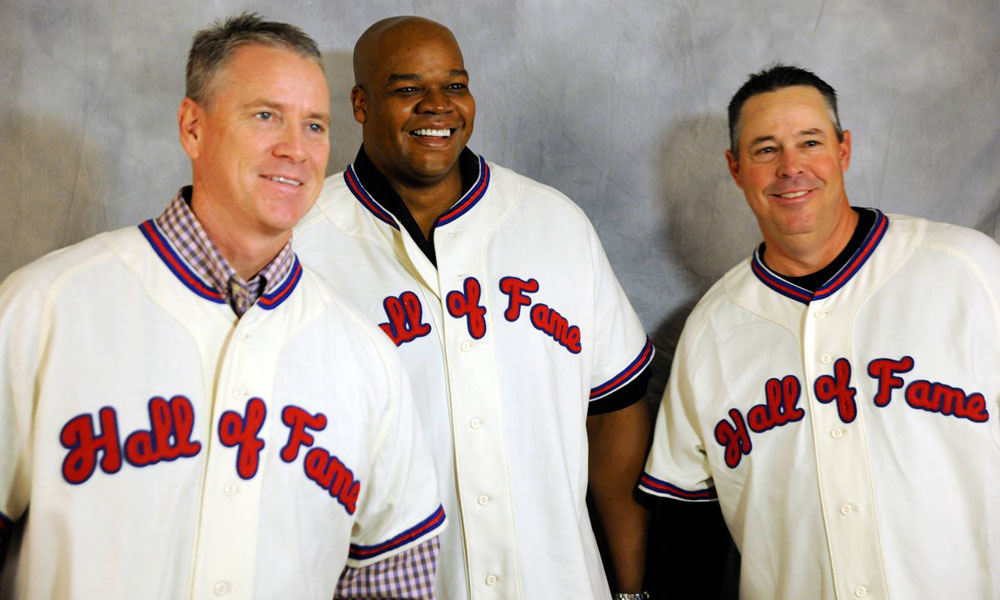
A Question of Process: Baseball Hall of Fame Voting Stunt Draws Attention
In a move designed to protest the "avalanche of sanctimony" around the Baseball Hall of Fame vote, a Baseball Writers' Association of America member handed his vote to Deadspin readers—and lost his voting rights as a result.
To protest the “avalanche of sanctimony” engulfing the National Baseball Hall of Fame vote, a Baseball Writers’ Association of America member let the readers of Deadspin fill out his ballot—and lost his voting rights as a result.
In the age of steroids, it’s a vote that’s gotten more political and attention-grabbing every year.
The Baseball Writers’ Association of America’s balloting to choose new members of the Baseball Hall of Fame always seems to stir up emotions—especially last year, when the association’s members failed to give a single player enough votes to be inducted. (They did a little better this year, picking three ’90s-era superstars.) So, maybe it was only a matter of time before a protest of the process cropped up.
[I]n a climate without reform, my next 20 years of votes will be counted but not actually heard.
But crop up it did, when Deadspin revealed it had convinced a member of the association to give his ballot to the site, which then put the choice in its readers’ hands. Dan Le Batard, an ESPN contributor and Miami Herald columnist, offered his vote to the Hall for free after the Gawker Media-owned sports site failed to secure a paid block of votes from another anonymous source. A quick breakdown of what happened:
The site’s reasoning? Deadspin wanted to point out how problematic the voting process has become, due in part to the fairly exclusive club of voters, and how the process has overshadowed the players and their accomplishments. Only BBWAA members vote on the nominated players, who need the nods of 75 percent of the voters to make the Hall of Fame. “Much of the reason why the Hall of Fame process has become so contentious is that it’s plainly absurd that veteran baseball writers get a say denied to everyone else, from Bill James to small children,” the site’s Tim Marchman explains. (For what it’s worth, the Deadspin ballot choices included top three vote-getters Greg Maddux, Frank Thomas, and Tom Glavine, who will be inducted into the Hall of Fame. The big difference came in the fan selections of steroid-era players such as Mike Piazza, Barry Bonds, and Roger Clemens, who had a far higher level of fan support among Deadspin voters than among the actual voters.)
Why did Le Batard do it? The sports journalist says he handed over his ballot to Deadspin because he feels his vote had lost value and the process needs reform. “Given that climate, doing THIS has more impact than my next 20 years of votes as sanctimony bars the HOF [Hall of Fame] door on the steroid guys,” explained Le Batard. “Because, in a climate without reform, my next 20 years of votes will be counted but not actually heard.” His primary employer, sports network ESPN, said it respects his passion for reforming the process, but “wouldn’t have advocated his voting approach.”
Le Batard knew there would be a price to pay for his move: He says he fully expected to lose his vote.
And lose it he did. Hours after the news broke, BBWAA President La Velle E. Neal III revealed to The New York Times that the association had stripped Le Batard of his Hall of Fame voting rights and suspended his season-long credential to cover games for the next year—though he still can get daily credentials. While nothing in the organization’s constitution specifically barred what he did, the association does have the right to discipline members.
“This is a unique and, as far as I know, unprecedented situation,” Neal said to the Times. But it may set a precedent—Deadspin has promised to meddle in the process next year.
If faced with a protest over your organization’s voting process, how would you respond? Would you punish the voter or reconsider the process? Let us know your thoughts on this issue in the comments below.
2014 Baseball Hall of Fame inductees, from left: Tom Glavine, Frank Thomas, and Greg Maddux. (via the National Baseball Hall of Fame Facebook page)






Comments